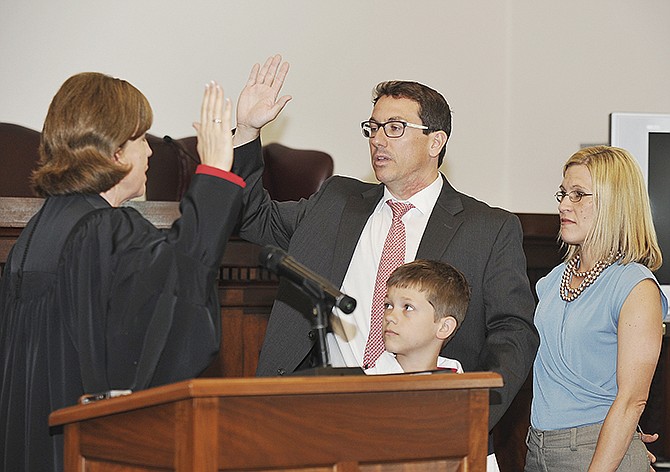Michael Barrett is Missouri's new state public defender - the head of a statewide system that functions as one of the largest law firms in the state, offering legal assistance to people charged with crimes who can't afford their own attorneys.
"It will be the greatest honor for me to champion, not only the liberties guaranteed under the Bill of Rights for poor people in this state, but also for these public defenders - these defenders of liberty - who take up the fight every day," Barrett said at the end of his nine-minute address to about 50 people gathered at the state Supreme Court building for the ceremony.
"Public defenders throughout this state, from West Plains to Kirksville, from Caruthersville to Kansas City, work tirelessly - and in unheralded fashion - to make sure that these essential principles of liberty endure.
"In turn, they are compensated the modern day sum of 18 guineas so that a poor person, who may never come to know great comfort in this world, or benefit from the full promise of democracy, will nonetheless assume equal stature to every other citizen in a court of law."
That "18 guineas" - according to ask.com - would be about $3,035 today and, Barrett noted, was what Boston lawyer and future U.S. President John Adams was paid as the assigned defense lawyer for eight British soldiers charged with killing five colonists in the March 5, 1770, incident known as the Boston Massacre.
"A remark over money owed to a local wig merchant escalated into shots fired," Barrett explained. "Though the events were very much tragic, for the Sons of Liberty like John and Sam Adams and Paul Revere, they saw it as a compelling act of oppression that could fuel anti-British sentiment throughout the colonies.
"They saw it as a potential change agent in their struggle to secure the natural rights of man. In many ways, it was emblematic of Ferguson, of North Charleston, of Cleveland, of Staten Island."
Adams, a well-known champion of the fight for colonial independence from England, agreed to defend the soldiers even though they represented "the very tyranny (he) was fighting to overcome," Barrett said, because Adams firmly believed "that governments should not be able to deprive someone of their liberty, regardless of who they are, without due process of law and without providing that person a competent attorney."
The future president "risked not only his reputation for these ideals, but the fate of the Republic," Barrett added, "once stating that a defense lawyer ought to be the last thing an accused person should be without in a free country."
That belief ultimately became the 6th Amendment to the U.S. Constitution, which states: "In all criminal prosecutions, the accused shall enjoy the right to a speedy and public trial, by an impartial jury of the State and district wherein the crime shall have been committed ... and to have the Assistance of Counsel for his defense."
That amendment gives public defenders their marching orders, Barrett noted, adding today's issues don't seem that different from what Adams faced.
"Public defenders encounter cynics every day in the court of public opinion, creating a stigma that manifests itself into questions like "Why do you represent these people?'" he said. "Even from our own clients, much work has to be done to build the rapport needed to overcome the fact that we look and dress very much like those representing the accuser. ...
"This degradation of liberty has begun to show evidence of two systems of justice - one for the resourced and well-connected, and the other for the least among us. The resulting carnage is a state that, according to the Department of Justice, ranks among the worst in the rate in which it incarcerates its citizens, and with little corresponding public safety gains."
Like his four predecessors, Barrett said, he'll keep working to change that.

